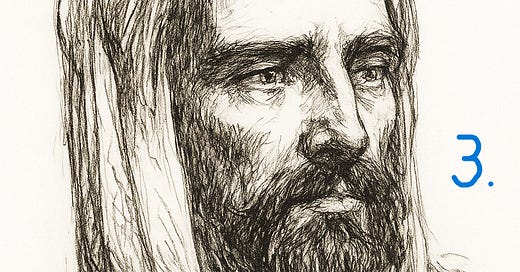🌟 Reputations Far-Reaching: Continuing The Conversation with Zuhayr [2].
A word associated with a man, follows him wherever he goes. Specially in the case of Poets
✨ The Story Continues:
Ibn Qarih had asked Zuhayr of the merit which had led to his pardon in the afterlife (Previous post). He is instantly reminded of another verse of Zuhayrs which he had heard in The Illusory World.
“Did you not, famously, compose these lines too?” Asked Ibn Qarih.
Wa-qad aghdaw ʿalā thubatin kirāmin || nashāwā wājidīna limā nashāʾu
And Indeed they’d rise at dawn, Men noble in gatherings
Drunk, rejoicing, fulfilled in every desire.
Yajurrūna al-burūda, wa-qad tamashshat || ḥumayyā al-kaʾsi fīhim wa-l-ghināʾu
Their robes trail behind them, flowing with grace,
Fiery warm wine stirring within them, and Songs.
Zuhayr replied in affirmative.
Ibn Qarih then proceeds to ask, “Has wine been made lawful to you like the other inhabitants of Paradise? or are you forbidden from it too like Al A’shaa?” (see the post Al-A'shaas Pardon)
“Al-A’shaa”, replied Zuhayr, “Lived on to see the Prophet ﷺ, so on him was placed the burden of responsibility. There, it was revealed onto him the banning of wine and all vileness : But at the time of my death, wine and other things were being drunk by the followers of the Prophet ﷺ, so there was no burden of responsibility incumbent on me”.
Ibn Qarih then invited him to have a drink, and found Zuhayr Ibn Abi Salma to be amongst the most delightful of companions. In his conversations, he asked Zuhayr much about the ancients.
[Lets understand this classical verse further & learn Arabic using this couplet!]
🟢 Understanding The Arabic Words in Context of The Verse:
Couplet 1:
وَقَدْ أَغْدُوْا عَلَى ثُبَةٍ كِرَامٍ
نَشَاوَى، واجِدِينَ لِمَا نَشَاءُ
💎 Meanings:
—> وَقَدْ أَغْدُوْا – And they would march at dawn / set out early.
—> عَلَى ثُبَةٍ – Toward or into the midst of a band / group / company (often of warriors).
—> كِرَامٍ – Noble, generous, dignified men.
—>نَشَاوَى – Drunk (pl. of nashwān), intoxicated (from wine).
—> واجِدِينَ – Rejoicing in, experiencing fullness (emotionally and materially); wajada here implies strong presence or enjoyment.
—> لِمَا نَشَاءُ – Of what we will, desire, wish — an assertion of plenitude and agency.
Couplet 2:
جُرُّونَ الْبُرُودَ، وَقَدْ تَمَشَّتْ
حُمَيَّا الْكَأْسِ فِيهِمْ، وَالْغِنَاءُ
💎 Meanings:
—> يَجُرُّونَ الْبُرُودَ – They trail their cloaks (burūd = heavy striped Yemeni cloaks, a status symbol).
—> وَقَدْ تَمَشَّتْ – While has coursed or flowed through (lit. "strolled")…
—> حُمَيَّا الْكَأْسِ فِيهِمْ – The fiery heat / intoxication of the wine-cup, within them.
—> ، وَالْغِنَاءُ – And songs/music — the word al-ghināʾ connotes festive singing or melodic chanting.
🔵 Intricacies of the Verse:
Verse; written in Bahr At-Tawil; expresses leisurely glory with an undercurrent of pride. The qafiya in the couplets go as ‘nashāwā / nashāʾu and tamashshat / ghināʾu’. The fluid verb forms used in the couplet linguistically reflect movement, enjoyment, and presence (aghdaw, yajurrūn, tamashshat)
In the Pre-Islamic Arabic couplet, Zuhayr paints a dual image here. One of martial brotherhood and leisurely intoxication, combining the classical themes of sharaf (honor) and ṭarab (ecstatic delight). Not mere drunkards, but dignified warriors indulging not in excess, but in celebrated, communal joy. The verse situates itself in a majlis of elite warriors or tribal chieftains, whose wine-drinking and cloak-dragging were not signs of decadence, but displays of power and refinement.
The trailing of cloaks here however, represents a status gesture. It connects to an allusion referenced in the Qur’aan Qur'anic ("wa-lā tamshi fī al-arḍi marāḥan", 17:37)1, revealing the social and poetic gravity of clothing and movement in Arab culture.
🔘 Roots of words and Their Classical Usages:
🌟 Forthcoming:
Ibn Qarih, now sets out to the other palace he saw. Of the other Pre-Islamic poet ‘Abid ibn Al-Abras, who had also died before coming of the Prophet ﷺ.
He says, “Salam un Alaikum” to him to which 'Abid replied kindly. 'Abid anticipates that he’s going to be asked the same question. To which he himself answers alluding to this couplet of his.
We’ll break down the following couplet, alongside the full conversation in our next post.
Footnotes:
وَلَا تَمْشِ فِى ٱلْأَرْضِ مَرَحًا ۖ إِنَّكَ لَن تَخْرِقَ ٱلْأَرْضَ وَلَن تَبْلُغَ ٱلْجِبَالَ طُولًۭا (Quran 17:37)
which is a sermon against arrogance and pride: “And do not walk on the earth arrogantly. Surely you can neither crack the earth nor stretch to the height of the mountains.”






